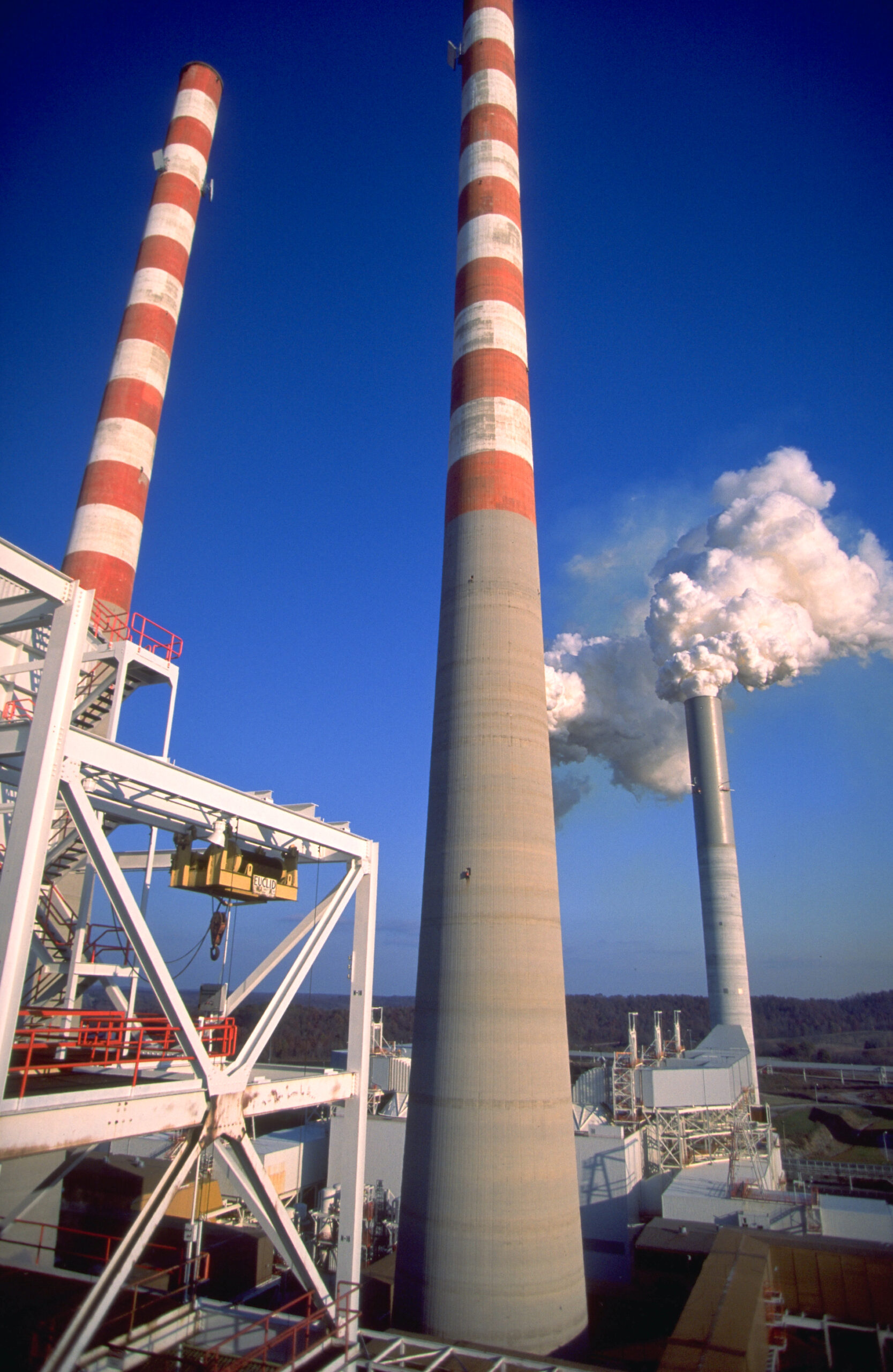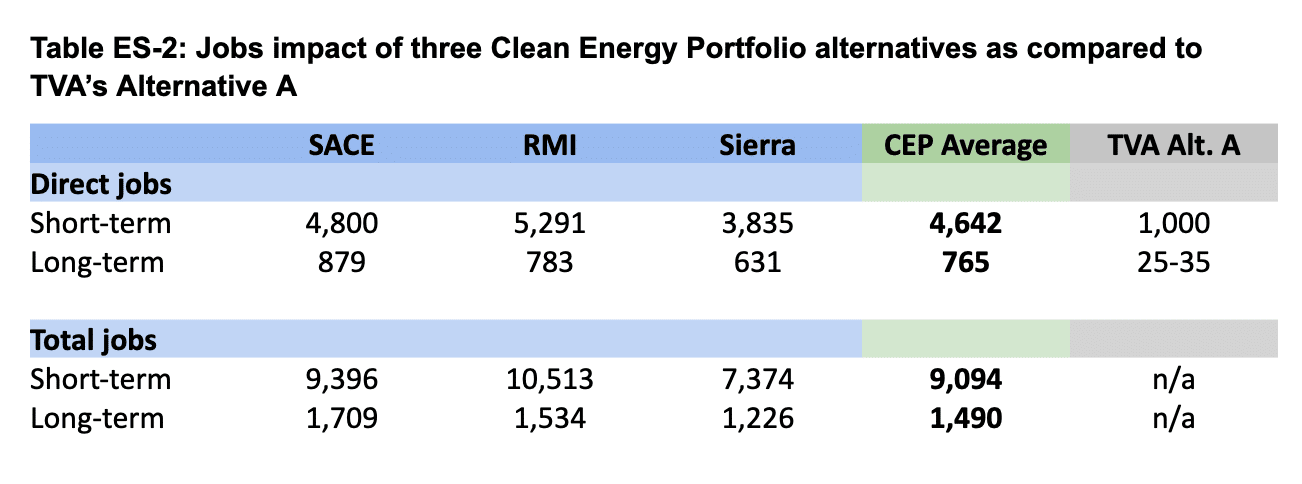Hundreds of concerned individuals, organizations, local elected officials, and power providers in the Tennessee Valley criticized TVA's proposed Cumberland fossil gas power plant and pipeline plans, and are calling instead for the financial, economic development, and environmental benefits that clean energy alternatives would deliver.
Guest Blog and Kate Tracy | July 8, 2022 | Coal, Fossil Gas, Tennessee, UtilitiesBrady Watson, former Civic Engagement Coordinator for the Southern Alliance for Clean Energy, co-wrote this blog post.
As we stated in an earlier blog post, the Tennessee Valley Authority (TVA) released a draft environmental impact statement (DEIS) in late April to determine how it should retire and replace the Cumberland Coal plant in Cumberland City, Tennessee.
As part of the DEIS, TVA identified three possible methods for replacing the coal power with:
- Alternative A: A large (1,450 megawatt) gas combined cycle (CC) power plant that would require the construction of a new 32-mile-long gas pipeline to the Cumberland site,
- Alternative B: Two gas combustion turbine (CT) plants (1,530 megawatts) at different locations, and
- Alternative C: 3,000 megawatts of solar and 1,700 megawatts of storage.
In the DEIS, TVA announced that its intention is to pursue Alternative A and replace the coal plant with yet another fossil fuel, in this case, a fossil gas plant and a 32-mile pipeline to transport gas to the plant.
As required by federal law, TVA held a public comment period to solicit public feedback on the DEIS that closed June 13th. During the comment period, concerned individuals, organizations, cities, and a local power company in the Tennessee Valley indicated a strong preference for reaping the financial, economic development, and environmental benefits that would result from TVA pursuing clean energy replacement options for Cumberland, specifically demand-side management and energy efficiency, renewable energy, and storage. Additionally, numerous groups pointed out that TVA failed its obligations to provide the public with the information necessary for adequately informed decision-making.
One of TVA’s largest customers urges TVA to prioritize clean energy to help the community meet goals, and be economically competitive
Nashville Electric Service, the Metropolitan Government of Nashville and Davidson County, and Mayor John Cooper all submitted separate comments and resolutions to TVA, calling on them to pursue less polluting energy options such as solar, while also highlighting the goal the city has put forth to reduce greenhouse gas emissions 80% by 2050. The comments also highlight how TVA’s investment in unnecessary fossil fuel infrastructure would saddle Nashville with the pollution resulting from a large gas plant at Cumberland for decades and undermine the city’s economic competitiveness in attracting businesses to locate locally.

EPA weighs in with concerns about TVA’s thoroughness, transparency, environmental impacts, and costs to customers
In a rare move, U.S. Environmental Protection Agency (EPA) officials found TVA’s plans for a new, multi-billion-dollar gas plant so flawed, its is encouraging the utility to change its plans or to choose another alternative entirely. This suggests EPA has substantial concerns and language this strongly-worded and lengthy from EPA is quite rare. The proposed plant’s climate impact would be so significant, that EPA goes as far as to say the agency “strongly recommends the proposed action be modified or a different preferred alternative be selected in the Final EIS.” TVA’s proposed gas plant would emit dangerous greenhouse gasses for decades to come, but EPA officials write that TVA’s draft EIS doesn’t adequately quantify or disclose the greenhouse gas emissions associated with its proposed plant. EPA officials wrote that TVA’s plan fails to analyze alternatives that include available and affordable renewable energy and energy efficiency options.
In the letter, EPA officials rightly point out that the proposed gas buildout would lock TVA’s roughly 10 million customers into paying for gas for decades, even as the costs of renewable energy options continue to fall. The financial risk associated with this lock-in is currently being demonstrated by volatile fossil gas prices increasing monthly power bills across the Tennessee Valley due to TVA’s fuel cost adjustment charges.
Advocacy groups speak out
We at the Southern Alliance for Clean Energy submitted comments calling on TVA to more thoroughly evaluate all replacement options instead of skewing its analysis toward its desired choice of fossil gas. SACE also highlighted the fact that if TVA does indeed elect to move forward with new fossil gas plants and pipelines, then TVA ratepayers will be stuck footing the bill to pay for volatile gas market prices and stranded asset costs down the road. Furthermore, we point out that TVA does not need additional gas to integrate renewables, as they often claim.
Additionally, Tennessee Interfaith Power and Light (TIPL), Appalachian Voices, Sierra Club, The Southern Environmental Law Center (SELC), the Center for Biological Diversity, and the Clean Up TVA coalition submitted comments on the DEIS. Given TIPLs faith-based approach, their comments focused on the need to protect our planet and future generations from climate change and pollution. Appalachian Voices’ organizational comments paid particular attention to the job impact of possible clean energy portfolios as compared to TVA’s preferred gas plant and pipeline. The chart from the comment letter below demonstrates various illustrative clean energy portfolios from SACE, Sierra Club, and RMI that would result in far more jobs than the fossil gas option.

The Southern Environmental Law Center’s comments – filed jointly with Appalachian Mountain Advocates, Sierra Club, Center for Biological Diversity, Appalachian Voices, Energy Alabama, and SACE – are wide-ranging technical comments focused on:
- TVA’s shortcomings in fulfilling obligations required by their DEIS filing,
- Lack of transparency with the public,
- Flaws in TVA’s analysis that bias the selection of the preferred replacement power resource, and
- Various environmental and socioeconomic impacts to Middle Tennessee.
The groups submitted a technical study by Synapse Energy Economics that Sierra Club commissioned, which showed that customers would save about $9 billion in the next two decades if TVA replaced its coal plants (including Cumberland and others) with a low-cost, highly-reliable clean energy portfolio instead of a business-as-usual portfolio of prolonged reliance on coal and expansion of fossil gas power.
The Center for Biological Diversity focused comments on the urgent crisis of climate change and how TVA’s decisions will impact Valley residents in an ever-warmer climate. Finally, the Clean Up TVA coalition, of which many of the aforementioned groups are a part including SACE, submitted its own comments combining many of the issues raised in the other group’s comments.
Individuals from around the Valley speak out
Hundreds of individual citizens added their voices urging TVA to replace the Cumberland plant with clean energy alternatives. Appalachian Voices members submitted more than 150 individual comments to TVA. Sierra Club members submitted more than 650 individual digital comments, including more than 300 personal messages, mostly focused on the affordability, reliability, and availability of renewable energy. Through the Clean Up TVA coalition, more than 350 people signed onto comments to TVA. Read some of the messages from TVA area residents delivered by the Clean Up TVA Coalition below. You can view the full petition and all individual comments here.
“Stop using carbon emitting fuels. Lead us to a clean renewable energy future. The technology is here already.” – Chet H., Knoxville, TN
“I am a scientist and a consumer of TVA power in Tennessee. I have reviewed TVA’s current plan for expanding power production capacity. I applaud TVA for the upcoming planned retirement of coal- fired plants: Cumberland Fossil and Bull Run. I am writing to support replacement of part of the retired fossil generation with clean energy producing solar, wind and battery storage options. In order to achieve the net-zero carbon objective and prevent irreversible climate damage from fossil combustion, TVA must step up to building clean energy infrastructure. It must start now.” – Debra D., Spring Hill, TN
“Please be a leader for renewable energy, to make up for all the greenhouse gas emissions that Tennessee has put in the atmosphere for decades. The next generation is depending on organizations like TVA to make a difference to help mitigate climate change and reduce the risk to humans around the world.” – Deb O., Knoxville, TN
“Solar + Wind + Battery storage are more cost effective than fossil fuels (leaking gas wells and fracking) because of three items:
1. solar + wind are free and have no input (fuel) costs and no fuel/well leaks of CH4 or CO2!
2. solar and wind have no output liability like above fuel leaks eg. 2500 sq mile methane cloud over NM ) and fuel burning emissions
3. Battery storage gets cheaper as it scales”
– Frank Warmath, Humboldt, TN
“In making its preliminary decision to build a large gas plant and pipeline, TVA has submitted an entirely inadequate full cost and environmental analysis, which is required by law under NEPA. TVA has already dumped 150 million tons of coal ash onto the land and into the rivers around the Kingston Coal Plant, resulting in extensive environmental damage. We can’t afford more risky and expensive fossil fuel investments or more environmental or human harm. The country is moving rapidly to renewable energy to confront the climate crisis, and TVA should be a leader in a just transition to clean energy instead of a disgrace to its own history.” – Helen D., Knoxville, TN
“Clean energy = healthy future, more jobs, and economic security.” – Isabelle M., Nashville, TN
“Please stop turning a blind eye to progress. TN needs to be the first in something rather than the follower. Stop spending money on old-date technology. Even your children want to progress in technology.” – John Nolen, Lenoir City, TN
“You are in a position to make a big difference to climate change. Be a hero!” – Karen S., Memphis, TN
“The people are at their financial limit, history will show the disregard for sane energy policies for profit. In the long run energy in a civilized nation should be safety first always.”– Nathan L., Memphis, TN
“The TVA ratepayers are going to be strapped with bearing the rising cost of natural gas as the unwise investment in gasification requires astronomical investment. The detrimental costs to public health, negative effects contributing to climate shift, especially from methane, along with other environmental concerns such as those caused by fracking, make gasification of retired coal plants completely unacceptable—but more precisely, unnecessary. The technology is here NOW to make use of all sources of renewables including WIND which must be added back in the mix! Instead of taking us forward, the CURRENT TVA BOARD is taking us backwards, pandering to BIG FOSSIL. We need the transition to a renewable energy economy NOW—the time is HERE. No “transition fuels”—renewables and storage NOW.” – Nancy Muse, Florence, AL
“TVA led the way in bringing electrification to the South. It should be leading the way making strides and investment in clean energy in the South. The sources for methane are dirty supply lines and have negative impacts across the board.We must care for our land so that it will continue caring for us.” –Jeremy W., Goodlettesville, TN
Next Steps
These comments will hopefully guide TVA to reconsider its preferred fossil gas replacement alternative for the Cumberland plant. We expect a final decision on the Cumberland plant by the end of 2022.